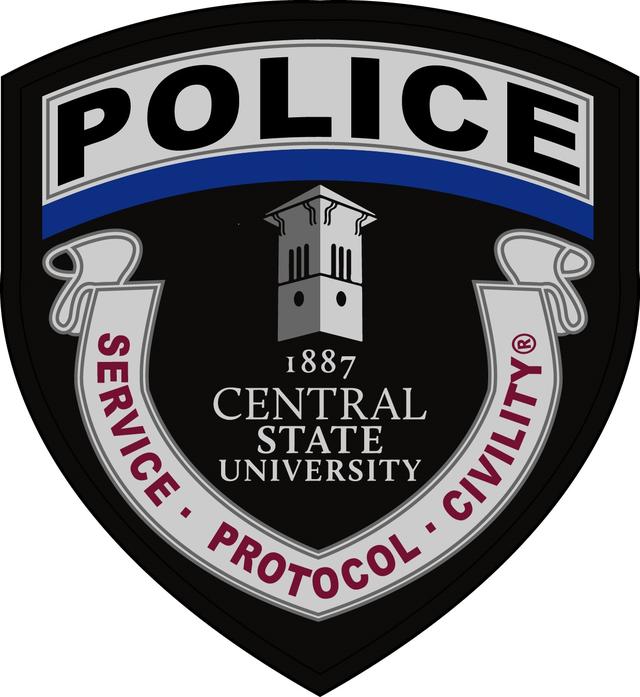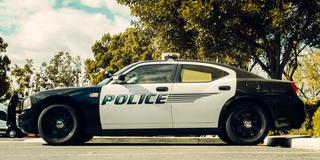

Central State University Department of Public Safety
Protection services
Welcome to the Central State University Office of Campus Police. Campus Police operates 24 hours a day, seven days a week.
Welcome from the police chief
Working together to advance a safe campus
The mission of the Central State University Police Department is to contribute toward the quality of University life by maintaining peace and harmony, protecting life and property, and enforcing all federal, state, and local laws and University rules and regulations pertaining to orderly conduct on its premises. Central State Police strives to maintain an atmosphere of professionalism, courtesy, and respect while embracing diversity through community engagement and hiring and training practices that enhance the University's mission.

Our highest priority: Safety and security
The safety and security of all members of the Central State community are among this Institution’s highest priorities. On behalf of University leaders, we want to assure our students and their families and faculty and staff that we have a coordinated and comprehensive plan in place for responding to a variety of emergencies that could occur as a result of human action or natural events. Members of the Central State University Office of Campus Police and Emergency Management teams work collaboratively with local and federal law enforcement agencies to monitor local, regional, national, and international events that may affect Central State University. Key information is shared between our team and the local, state, and federal law enforcement teams.
To receive safety alerts, download the Alertus app.
The Central State University campus is currently operating under NORMAL conditions.
Emergency procedures and safety
-
The following list of telephone numbers, email addresses, and social media sites is important and should be kept available for easy access.
Administration: 937-376-6368
Non-emergency: 937-376-5111
Emergency: 9-911
Confidential hotline: 937-376-6385
Email: police@centralstate.edu
Silent witness email: silentwitness@centralstate.edu
Facebook: Central State University Police Department Crime Prevention Unit
Twitter @CSUChief
Office hours
9 a.m. to 5 p.m. Monday to Friday -
Serious water damage may occur from a number of sources, such as broken pipes, clogged drains, damaged skylights or windows, or construction errors.
If a water leak occurs:
- Remain calm.
- Call 937-376-6622 first. If no one answers at that extension, dial the work order line at 937-376-7887 or 937-376-6628 or Police and Safety at 937-376-5111.
- If you observe electrical appliances or outlets near the leak, use extreme caution. Evacuate the area if there is any potential danger.
- If you know the source of the water and are confident of your ability to stop it (e.g., unclog the drain, turn off the water, etc.), do so.
- Be prepared to assist as directed in protecting objects that are in jeopardy. Take only essential steps to avoid or reduce immediate water damage, such as covering objects with plastic sheeting or moving small or light objects out of danger.
-
If a power outage occurs in your office or building:
- Remain calm.
- Assist others in your immediate area who may be unfamiliar with the space.
- If you are in a dark area with no lights, proceed cautiously to an area that has emergency lights.
- If you are in an elevator, remain calm. Use the emergency button or telephone to alert the Police Department.
- If instructed to evacuate an area, proceed cautiously to the nearest exit.
- Dial 937-376-6622 or the work order line at 937-376-7887 or 937-376-6628.
- Initiate power outage protocols for critical operations such as fume hoods.
-
If someone becomes ill or is injured and requires immediate assistance:
- Dial 911 to contact Central Communication.
- Police will provide the required services.
- Unless trained, do not attempt to render first aid before trained assistance arrives. Keep the victim calm. Direct or have someone direct the first responder to the scene of the emergency.
- Do not attempt to move a person who has fallen and appears to be in pain.
- Reassure the ill or injured person; do not comment on the illness or injury.
- After the person’s immediate needs have been met, remain at the scene and provide information as requested.
- If the victim is a staff member, the victim’s supervisor should fill out the University’s Accident Report relative to the incident.
- Planning for such emergencies includes being trained in emergency first aid procedures and CPR.
-
Tornado warning
A tornado warning is the sounding of the emergency sirens for three minutes followed by seven minutes of silence. A warning indicates a tornado has been sighted by ground observers or has appeared on the radar within Greene County.- Stay inside, and be alert to falling objects.
- If possible, leave temporary or lightly built structures for nearby structures that are sound in their construction. Your distance of travel should be no more than 50 yards to the secure site.
- Stay away from windows, mirrors, glass, and unsecured objects, such as filing cabinets or bookcases.
- Proceed to a below-ground level or a central hallway of the building, if possible.
- Do not use elevators.
- If requested, assist persons with disabilities to the safest area on the same floor.
- Remain in the safe area until at least 10 minutes has elapsed without the sounding of the sirens or the all clear has been given.
- Planning includes identifying the appropriate buildings and places in your building to seek shelter should a tornado or other severe weather occur.
-
The following is a list of tornado shelter/assembly locations. Use the list below based on your location on campus if you hear tornado sirens and/or receive a notification through Alertus.
DO NOT USE ELEVATORS. STAY AWAY FROM GLASS DOORS AND WINDOWS.
Lionel H. Newsom Administration Building: Basement, basement bathrooms, Room #20, Storage Room #29, Room #25, snack room
Louis Stokes Center on Aging/Lackey Health Center: Basement, bathrooms
Charles H. Wesley Arts & Science Building: Room #112, Room #110, first floor back hallway
Walter G. Sellers Alumni Tower: Mechanical room
Norman E. Ward Sr. University Center: Basement, first floor interior hallways, interior bathrooms
Anne O’Hare Williamson Hall: Basement, basement hallway, laundry room
Jane Hunter Hall: Basement, basement hallway, laundry room
Clara Henderson Hall: Lower-level hallway, bathrooms
Hallie Q. Brown Memorial Library: Basement
Madison W. Beacom/Gaston F. Lewis Gymnasium: Back interior hallway
Natatorium (pool area): Locker rooms
James J. Walker Gymnasium: Basement, interior hallway outside of weight rooms
Mass Communications Center: Studio, Room #126, interior hallway
William Patrick McPherson Memorial Stadium: Weight room
Steam Plant: Basement
Facilities/Maintenance: Relocate to Jenkins Hall or Charles S. Smith College of Business
Charles S. Smith Hall College of Business: Basement, first floor hallways
C.J. McLin International Center for Water Resources Management: Interior hallways, interior bathrooms
Carl C. Jenkins Hall: Interior hallways, interior bathrooms
Joseph D. Lewis/George T. Simpson: Relocate to Jenkins Hall
Sunie S. Green Hall: Basement, first floor interior hallway
Elizabeth M. Anderson Hall: Basement, first floor interior hallway
Foundation Hall I: First floor interior hallways, first floor interior rooms, first floor interior bathrooms, under staircase on first floor
Foundation Hall II: First floor interior hallways, interior rooms, interior bathrooms
Paul Robeson Cultural & Performance Hall: Interior hallways, interior bathrooms, Room #110, #117, #123, #125, and #147
Administration Annex/Pre Law: Relocate to Stokes basement or Administration Building basement, interior bathrooms
Harry G. Johns Living Learning Center: Basement, first floor interior hallways, first floor interior bathrooms
John R. Fox Hall: Basement, first floor interior hallways, interior bathrooms
E.J. Emery Hall: Ground floor rooms, interior hallways, interior bathrooms
Joshua I. Smith Center for Education & Natural Sciences: Basement, first floor interior hallways, first floor interior bathrooms
University Student Center: Ground floor bathrooms, hallway located behind the WOW Cafe, and WOW employee locker room
Shorter Road Apartments: First floor bathrooms and hallways
Honors Hall: First floor hallways and bathrooms
Marauder Pride Community (MPC): First floor bathrooms and interior hallways away from windows.
-
Chemicals, leaking gas, faulty boilers, or falling aircraft could be the cause of a life-endangering explosion.
- Dial 9-911 if there is an explosion.
- Remain calm.
- Be prepared for further explosions.
- Seek shelter. Crawl under a table or desk.
- Stay away from windows, mirrors, overhead fixtures, filing cabinets, bookcases, and electrical equipment.
- Listen to the instructions of Police and/or Fire Department personnel. If evacuation is ordered, proceed to one of the designated exits.
- Do not move seriously injured persons unless they are in obvious immediate danger (of fire, building collapse, etc.).
- Open doors carefully. Watch for falling objects.
- Do not use elevators.
- If requested, accompany and assist people with disabilities who appear to need direction or assistance.
- Do not use matches or lighters.
- Avoid using telephones.
- Do not spread rumors. The University will provide specific communication about the incident.
-
In advance, each staff member should:
- Understand the evacuation plan.
- Recognize the sound of the evacuation alarm.
- Know at least two ways out of the building from your regular workspace.
When you hear the evacuation alarm or are verbally told to begin evacuating the building:
- Remain calm.
- Leave quickly. Move away from the building.
- Try to ensure that all people within your building hear the alarm and evacuate the area.
- As you exit, quickly check nearby restrooms, copier rooms, storage rooms, etc.
- When requested, accompany and assist people with disabilities who appear to need direction or assistance.
- Take with you essential personal items only. Do not attempt to take large or heavy objects.
- Shut all doors behind you. Closed doors can slow the spread of fire, smoke, and water.
- Proceed as quickly as possible but in an orderly manner. Do not push or shove. Hold handrails when you are walking on stairs.
- Once out of the building, move away at least 100 feet from the structure or as instructed by Police or Fire Department officials.
-
How to report a fire
- If you smell a burning odor or see smoke, dial 9-911. Report the exact location of the fire and, if known, what is burning. If you detect a fire, sound the building alarm by pulling an alarm station, which will cause the alarm horns to sound. It automatically notifies the dispatcher.
- Never allow fire to come between you and an exit.
- Remove all people from the danger area. Close doors behind you to confine the fire.
Response to audible fire alarms
- If the audible horn alarms sounds for more than 30 seconds or starts to sound for a second time, evacuate the building.
- Do not use the elevators.
- When requested, accompany and assist people with disabilities who appear to need direction or assistance.
- Leave all parcels and personal property inside.
- Remain approximately 100 feet from the exits to help facilitate clear access to the building for the Fire Department.
- Return to the building only when instructed to do so by Police or Fire Department officials.
-
If a chemical spill occurs:
- If toxic chemicals come in contact with your skin, immediately flush the affected area with clear water.
- Dial 9-911 immediately.
- If there is any continued possible danger, evacuate your area.
If a chemical fire occurs:
- Remain calm.
- Dial 9-911.
- If the fire is small and you have received training, attempt to put it out with a fire extinguisher or other available means. Do not jeopardize your personal safety.
- Never allow the fire to come between you and an exit.
- Evacuate your area if you cannot extinguish the fire. Close doors and windows behind you to confine the fire. Proceed to an exit.
- Do not break windows. Oxygen feeds a fire.
- Do not attempt to save possessions at the risk of personal injury.
- Do not return to the emergency area until instructed to do so by Police or Fire Department officials.
- All chemical spills and fires, no matter how small, should be reported to the Department of Police and Safety at Ext. 66l3.
- Planning includes training in the proper use of fire extinguishers and knowledge of their locations.
-
It is possible, although highly unlikely, that a staff member may someday receive a threatening telephone call or letter or a suspicious parcel or discover a suspicious object somewhere on the premises.
If you receive a telephone threat:- Remain calm.
- Listen carefully. Be polite and show interest. Try to keep the caller talking so that you can gather more information.
- Upon completion of the call, immediately notify University Police at 937-376-5111 and complete the Explosive Device Data Card to ascertain as much information from them as possible.
A suspicious item is defined as anything that is out of place and cannot be accounted for or any item suspected of being an explosive device.
If you receive a written threat or a suspicious parcel, of if you find a suspicious object anywhere on campus:- Refrain from handling it or going near it, and keep anyone from handling it or going near it.
- Do not use portable radio equipment or cellphones within 100 feet of the suspicious item.
- Notify University Police at 937-376-5111 immediately.
- Promptly write down everything you can remember about receiving the letter or parcel or finding the object. Police will need the information.
- Remain calm. Do not discuss the threat with other staff members.
- Be guided by police instructions.
- Planning includes being familiar with the appearance of suspicious packages.
-
Here are a few suggestions for what you might do to prevent a crime in your area.
In your office- Lock your door, even if you are just going down the hall. It takes a thief 10 seconds or less to enter an open room and steal your property.
- Do not leave messages on your door indicating that you are away and when you will be back.
- If someone asks to use your phone for an emergency call, offer to call for them instead of giving them access.
- Do not put your address on your key ring.
- Do not leave keys in hiding places.
- Call University Police at 937-376-5111 to report suspicious people or activities.
When walking
- Avoid walking alone at night unless absolutely necessary.
- Walk purposefully and know where you are going. Project a no-nonsense image.
- Carry a whistle to sound an alarm in the event of threats.
Protecting your automobile or bicycle
- Always lock your vehicle.
- Lock bikes to immovable objects or bike racks with hardened-alloy locks and chains or U-shaped locks.
- Do not leave tempting valuables or property visible inside your vehicle. Lock these items in the trunk.
Protect yourself when driving
- Look into your car before getting in. Lock doors and roll up windows once inside for protection.
- Do not stop to help occupants of stopped or disabled vehicles. Continue driving to the nearest phone and call assistance for them or use your cellphone.
- If your vehicle breaks down, raise the hood, and then lock yourself into your car. If someone stops and offers you help, remain in your car and ask them to call for help.
Call University Police at 937-376-5111 for detailed crime prevention information.
Alertus app
What is the Alertus Recipient App?
The Alertus Recipient App allows end users to receive push notifications from the Central State University alerts system using Wi-Fi and cellular signal.
Learn more by visiting the technology support page for installation directions for desktop, iPhone, and Android.

PSA shines light on use of NARCAN
Careers
EEO Statement: Central State University, an 1890 Land-Grant Institution, offers its programs and activities to people of diverse backgrounds and does not discriminate on the basis of age, ancestry, race, color, disability, gender identity or expression, genetic information, HIV/AIDS status, marital or family status, military status, national origin, political beliefs, religion, sex, sexual orientation, or veteran status. The University is an Equal Opportunity Institution. For inquiries regarding non-discrimination policies or accessibility, please contact the Department of Human Resources at 937-376-6540.